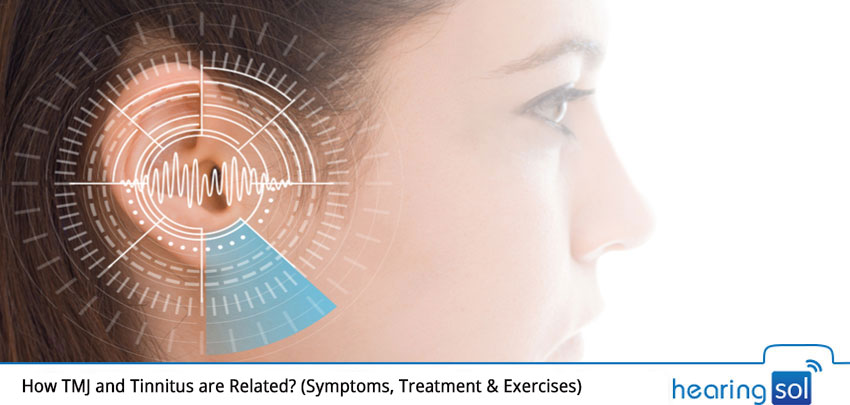
TMJ and Tinnitus (temporomandibular joint) are basically two different medical terms interconnected to one another, where ‘Tinnitus’ is basically a hallucination, in layman term ‘sensation’ of noise or ringing or hissing or clicking or roaring or buzzing in the ears affecting more than one in a group of five.
You can purchase the latest hearing aids at a fair price through HearingSol, If you need any assistance or you have a query regarding TMJ and Tinnitus or Hearing Loss, feel free to call us at +91-9327901950. We are always here to help you.
However, not dangerous but still, a serious underlying medical condition causing irritation to those who are used to noise exposure or have dealt with an ear injury or facing bad blood circulation.
What Is Temporomandibular Joint (TMJ)?
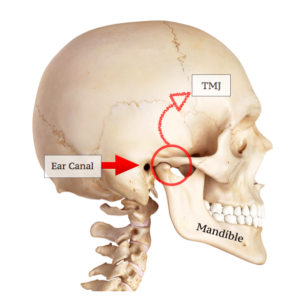
It is the joint that connects your jaw to your skull. You have one joint on each side of your jaw. These joints coordinate with ligaments, muscles, discs, and bones in your face, head, and neck to help you chew, yawn, and talk.
Any injury or damage to this joint can lead to a localized pain disorder called temporomandibular joint (TMJ) syndrome.
How Are TMJ And Tinnitus Interconnected?
Yes, Tinnitus and TMJ are interconnected, Why? Because Tinnitus is an outcome of TMJ, How? Let us see.
‘TMJ’ joints are connected with the bones, used to control the movement of the jaw.
The frequent movement leads to wear and tear of the disk which causes a substantial increase in the pain as the joint is connected in front of the ear.
There is interlinking between ear and ligaments connected to the jaw. Hence the consistent wear-tear (stress) laid on joints leads to the symptoms of ‘Tinnitus’.
The nerve supply from ‘TMJ’ is directly connected to the brain which results in loss of hearing, further leading to the symptom of ‘Tinnitus’.
The interconnection between them is such that, ‘Tinnitus’ changes when we yawn, chew, shout, jaw clenching and even the jaw movements improve the ‘Tinnitus’, whereas certain movement aggravates the problem.
A study by Semantic Scholar to find the prevalence and awareness of Temporomandibular Joint Disorders among the patients at King Abdulaziz University, Dental Hospital concluded the following information.
It shows the pain, headache, clicking, and Ms tenderness among the study sample in relation to TMD.
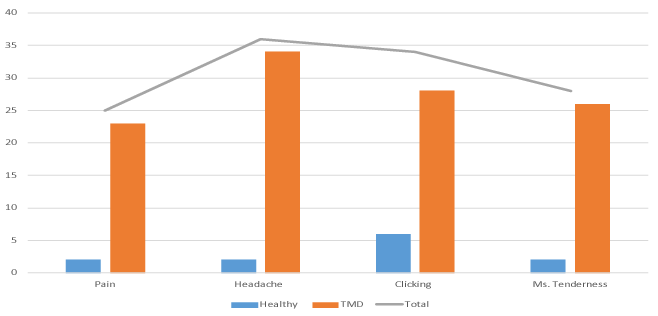
Why TMJ Syndrome Leads To Tinnitus?
There are three main theories why Tinnitus caused by TMJ-
- Chewing muscles are near to some of the muscles that insert into the middle ear, so it may affect hearing.
- There can be a direct connection between the ligaments attached to the jaw and one of the hearing bones that sits in the middle ear.
- The nerve supply from the TMJ has connections with the parts of the brain that are involved with both hearing and the interpretation of sound.
Causes Of Tinnitus And TMJ
TINNITUS
- Injuries To The Nerves
- Head Injury.
- Exposure To Loud Noise.
- Age Factor.
- Otosclerosis(caused by abnormal bone growth).
- Meniere’s Disease(caused by the imbalance in fluid pressure).
TMJ Disorders
- Acoustic Neuroma(a non-cancerous tumor that hinders the balance of the hearing).
- Blood Vessel Disorders.
- High Blood pressure.
- Tumors
- High Dose Of Medication(Antibiotics, Steroids).
- Misalignment of the Disk
- Wear and Tear in Joints
- Arthritis
- Accident
- Stress
- Bruxism(Teeth Grinding)
- Poor Posture
Effects of TMJ
- Stiff jaw muscles
- Limited movement of the jaw
- Pain that travels through the face, jaw or neck
- Change in the way the upper and lower teeth fit together.
- Painful clicking in the jaw.
Diagnosis For Tinnitus And TMJ
Diagnosis for Tinnitus
- Hearing Test: This exam is conducted by an ‘ENT’ Specialist, In order to rectify the Tinnitus symptoms. You will be given headphones where specific sounds would be played and you have to indicate that to the specialist. Further, the specialist will monitor your present result with the normal data and any discrepancy in the data will lead to the clarification that a person is suffering from Tinnitus.
- Movement Test: Specialist will ask you to do a certain task like clenching of the jaw, movement in arms, movement in legs, etc. If any of these affect your tinnitus then there is a need to see a specialist.
- CT Scan OR MRI: An ENT specialist may also refer you to have a CT scan and MRI scan done for proper examination.
Diagnosis for TMJ
There is no such diagnosis test for TMJ, it is totally dependent on the following symptoms-
- Jaw pain
- Neck pain
- Ear infection
- Facial nerve pain
- Headaches
Medical Treatment For Tinnitus And TMJ
These medical conditions are such that it will not vanish by itself and hence will require healing support treatment in order to get a healthy lifestyle back on track.
Now the question arises that how we can cope up with these medical conditions? Let me guide you so that all those facing these problems benefit from this article.
Let us start with the healing treatment for Tinnitus.
Treatment of Tinnitus due to TMJ
- Use of Hearing Aids: Question arises why Hearing Aid? Because in some cases tinnitus also resulted in a substantial increase in hearing loss. Hence, ‘Hearing Aid’ will be quite helpful, especially for old age people.
- Use of Masking Device: Masking device is basically a Tinnitus masker, used to suppress the ‘Symptoms Of Tinnitus’ i.e buzzing, ringing, etc. The unwanted irritating sound is minimized to a more pleasant sound by this device by simply adding artificial and natural sound in order to evade the effect of Tinnitus. There is also a dual-purpose hearing device that caters to the treatment of both Tinnitus as well as hearing loss,(2 in 1device).
- Practice Yoga: This four-letter word ‘YOGA’is enough to tackle and eventually cure ‘Tinnitus’ if performed consistently and religiously. It will also help in balancing the mind with the body. There are certain following ‘Yogic-Asanas’ which will help in diminishing ‘Tinnitus’ from your life.
Some of Best Yoga Asanas For Tinnitus
1. Trikonasana: It is also known as ‘Triangle Pose’. It increases the blood circulation near your head and neck. It also helps in relaxing the surrounding muscles which further relaxes the ear resulting in a reduction of odd noises.
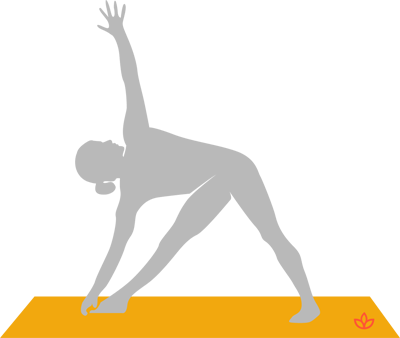
How to Do it:
- Stretch your feet and raise your arms parallel to the floor with your palms facing down
- Move your left foot such that your heels form a straight line
- Twist your body to the right side and extend the upper portion of the body and bend towards the floor.
- Now, touch your right foot with the right hand and extend your left arm which will naturally move in a backward direction.
- Wait for a minute and focus on your left hand.
- Perform the same in other direction.
2. Padangusthasana: This asana also helps in improving the blood flow to the brain which further helps in reducing the stress from the nerves and also helps in releasing the toxins from the body.
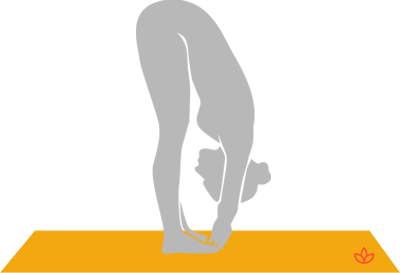
How to Do it:
- Place your hands on your hips and inhale when in a still position and then bend your hips as you exhale.
- Stretch your fingers and touch and hold the thumb of your toes with the help of thumb, middle, and index finger of your hand.
- Move your torso forward where feet must be parallel to each other and try to stretch and lift the tailbone(Coccyx) and hold in that position for a few seconds.
- Release.
3. Adho Mukha Svanasana: This asana helps in stretching as well as strengthening the spine, as we all know that the spine is the pillar of the body. It will not only cure ‘Tinnitus’ but also reduces ‘Cholesterol’ to a large extent.
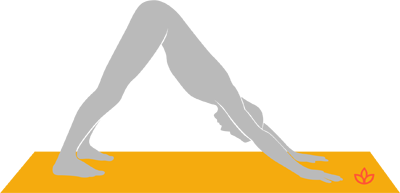
How to Do it:
- Make an ‘A’ position shape, resting on both the hands wide apart where your face should be downwards and hips upwards.
- Feet should be straight and flat on the ground, arms should be wide enough such that there is an increase in flexibility
- The posture should be like an alphabet ‘A’, seen from another perspective.
- Hold yourself in that position for a few seconds and relax.
4. Tinnitus Retraining Therapy (TRT): It is a process of learning to concentrate or to train a person to have the ability to divert attention from that irritating odd sound which is the main symptom of ‘Tinnitus’.
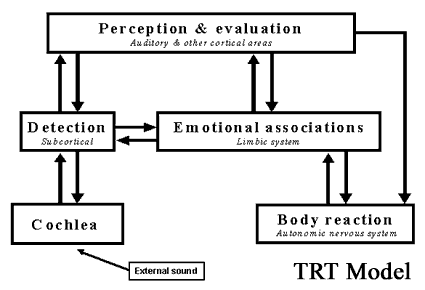
TRT is based on three steps:
- Evaluation of patient history like what he or she eats, what is his or her profession vice-versa
- Ear devices are used to generate friendly background sound which neglects the odd sound of the tinnitus.
- The main point is to teach the patient how to ignore the noise which generally happens from anxiety, depression vice-versa.
5. Importance Of Diet In Our Daily Routine: To heal and cure Tinnitus, one should have a proper healthy balanced diet. Why so? Because the nutrients from rich diets will fasten up the curing period of Tinnitus.
Avoid having ‘Fast Food items’ like ‘Burger’, ‘Pizza’,’Cold-Drinks’ etc and take a good proportion of Fruits and Green vegetables.
Treatment for TMJ
- TMJ Exercises to strengthen your jaw muscles
- Medications
- Ice Packs: Usually we have seen that person suffering from ‘TMJ’ is made to put an ice pack on the affected joint which reduces the swelling and further diminishes the symptoms of ‘TMJ’.
- A night guard or bite plate which can help to decrease clenching or grinding of teeth.
1. Exercises to Strengthen Jaw Muscles
A. Relaxation
You must check multiple times per day to see how relaxed or tight your jaw muscles are at that moment. If you feel your jaw to be tight, take a moment to do deep breathing.
Focus on your shoulder, jaw, neck, head, and facial muscles. Try to focus on one group of muscles at a time. Don’t move on to another group until the muscles you are working on start to relax.
B. Up and Down Stretching
You must perform stretching exercises only when your jaws are relaxed. If you’ll try to stretch your jaw without relaxing can strain them and worsen the pain.
Relax your jaw muscles, and gently open your mouth as wide as possible. Do not try to open your mouth beyond your comfort level. Keep open for a few seconds and then close gently. Repeat this for few times a day.
C. Side-to-Side Stretching
Keep your mouth closed but slide it to the left. Try to look right while doing this. It will help you deepen the stretch. Hold it for few seconds and then slide your jaw to the right and look left.
D. Resisted Closening and Opening Exercises
Those experiencing a lot of pain should not do this exercise. Basically, resistance exercises are used to improve the strength of the jaw muscles.
Put your thumb under your jaw. Press up gently. While using the resistance of your thumb, slowly open your mouth. Repeat this a couple of times.
E. Side to Side resistance
Place the palm of your hand against your jaw and push against it gently. Repeat this on the other side.
2. Medications
- Nonsteroidal anti-inflammatory drug: It relieves pain and decreases and also reduces fever.
- Nerve pain medication: It blocks the pain caused by the damaged nerve.
- Analgesic: Relieves pain.
- Muscle Relaxant: It helps to reduce muscle tension and relieves muscle pain and discomfort.
3. TMJ Diet Plan
- Small meal: Eating small meals will help you to stabilize blood sugar as fluctuations in blood sugar can increase the grinding of teeth.
- Foods you can easily chew: Foods such as soups, stews, smoothies, or cooked vegetables are easy to chew when you have jaw pain.
- Steamed vegetables: These are easy to chew. Steamed vegetables provide important nutrients to heal.
- Good foods: You must include good foods such as fruits, cottage cheese, mashed potatoes, scrambled eggs, smoothies, soup, and yogurt in your diet.
- Protein shakes: You can try protein shake if you have a problem chewing protein.
- Magnesium-rich foods: Magnesium is a relaxation mineral. It can help in releasing tight muscles.
4. Foods to Avoid
- Sugar: Sugar increases inflammation and lowers the immune response.
- Foods containing salicylates: Many vegetables and numerous fruits contain a high quantity of salicylates. Jams, jellies, and juice are also high in salicylates, and so are hot peppers, olives, radishes, tomatoes, and water chestnuts.
- Foods with high levels of vitamin C or iron and products that contain sugar, yeast, or preservatives.
- Wheat and dairy foods
Conclusion
Many patients are given only home care instructions at a single visit, while some require an average of 4-6 months of care.
Over the last few years, methods for diagnosing and treating TMJ Disorders and the accompanying symptoms of tinnitus have improved.
In future research also, greater knowledge regarding Tinnitus and Temporomandibular joint disorder will come into action. Hence, higher success rates will be available in future diagnosis and treatment.
You can purchase the latest hearing aids at a fair price through HearingSol, If you need any assistance or you have a query regarding TMJ and Tinnitus or Hearing Loss, feel free to call us at +91-9327901950. We are always here to help you.

 Reviewed by Mr. Ranjeet Kumar
Sr. Audiologist, Speech Therapist & Cochlear Implant Specialist, BASLP on
Reviewed by Mr. Ranjeet Kumar
Sr. Audiologist, Speech Therapist & Cochlear Implant Specialist, BASLP on